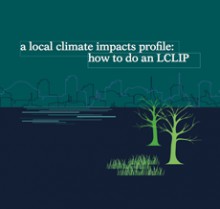News
Local Climate Impacts Profile (LCLIP) - New Guidance Online

| Date | Monday, March 15, 2010 |
|---|---|
| Topic | Planning, Land & Flood Defence Greenhouse Gas Emissions & Climate Change Sustainable Development Environment Governance & Civic Participation |
The phenomenon of climate change continues to move up the local government agenda. As it does, councils and other organisations are becoming increasingly aware of the potential impacts of a changing climate and the need to develop adaptation responses.
The LCLIP process highlights a locality’s vulnerability to severe weather events and how these events affect local communities as well as local authority assets, infrastructure and capacity to deliver services.
An LCLIP is a pragmatic, and effective, starting point for a better understanding of the future. For Local Authorities, undertaking a local climate impact profile (LCLIP) is one way for local authorities to meet Level 1 of National Indicator 188 – planning to adapt to climate change.
For more information visit the LCLIP pages on the UK Climate Impacts Programme website.
 Download a pdf of the LCLIP guidance (pdf, 5.6 MB)
Download a pdf of the LCLIP guidance (pdf, 5.6 MB)
You may have found us by using the following keywords: Our Climate, Climate Change Partnership, Climate Change, Regional, Adaptation Sub-Group, Adaptation, Local Authorities, Strategy and Monitoring, Built Environment, Transport, Health Services, Business, Land Management, Citizen Engagement, Energy, Waste, Water, Carbon, Flood risk, Mitigation, Leadership, Low Carbon Products, Low Carbon Services, Zero Carbon, Integrated Regional Strategy, Yorkshire and Humber Strategy, Climate Change Act, Regional Adaptation Study, Climate Change Plan for Yorkshire and Humber, Climate UK, Regional Coordinator, Low Carbon Economy, Bio-mass, Carbon Capture, Microgeneration, Local Area Climate Change Network, YoHr Space, Climate Change Board, Impacts, Vulnerability, Opportunities, CO2, NI188, NI186, NI185, NI187, Temperature, Rainfall, Extreme weather






